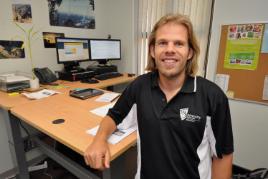National grant backs CQUni's 'tailored video for physical activity' project
Published on 25 Oct, 2012
Media Contact:For Immediate Release
CQUniversity researchers have gained almost $700,000 to study the effectiveness of tailored videos in promoting physical activity via the internet, through a prestigious grant from the National Health and Medical Research Council.
As part of the project seeking the best ways to encourage people to increase their physical activity levels, personally relevant video messages are selected from a database based on each viewer's response to lead-up questions.
LINK to Video killed the radio star but can it also give people a new lease on life?
Dr Vandelanotte says the NHMRC funding will extend the study to include a wider range of tailored videos.
"Early on we have found that people prefer the videos to be delivered to their computer rather than via hand-held devices and they are responding well to video-delivery, spending about twice as long interacting with the program, compared with text-delivery where people quickly skim and scan the text before moving on," he said.
The grant was awarded after a highly competitive process, proving the quality of public health research at CQUniversity.

Dr Corneel Vandelanotte
Click here to View/Download full-sized Image
Dr Corneel Vandelanotte* is leading the research team, including his colleague Dr Mitch Duncan, former CQUniversity professor Kerry Mummery (now at Canada's University of Alberta) and Professor Ronald Plotnikoff from the University of Newcastle.
Earlier this year, CQUniversity decided to build capacity in this project area by awarding 'post-doctoral researcher' internal funding of $300,000 over three years via the Research Advancement Award Scheme.
This recognition comes in the wake of Dr Vandelanotte's selection among Queensland's Young Tall Poppy Science Award Winners, towards the end of 2011.
Dr Vandelanotte's research is focused on finding effective and innovative methods to increase physical activity in large numbers of Australians at a low cost. He has designed and evaluated several innovative website-delivered physical activity interventions.
The researcher completed his PhD at Ghent University in Belgium in 2004, and moved to Australia in 2005. He's now based with the Centre for Physical Activity Studies at the Institute for Health and Social Science Research at CQUniversity.
ENDS

